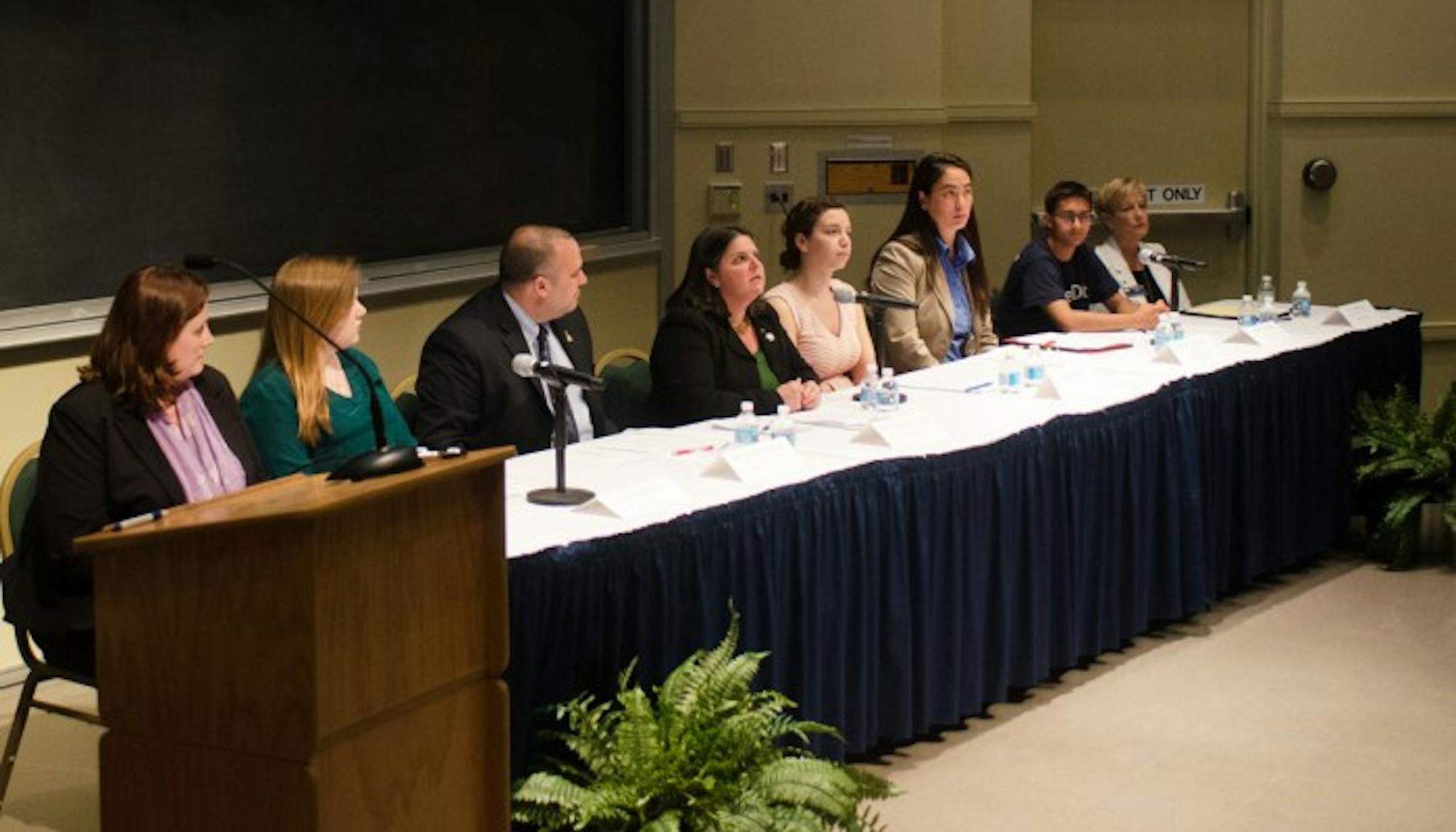Following the Monday morning release of the results of the 2015 Campus Climate survey on sexual assault, a campus community town hall was held Wednesday evening in order to offer an “opportunity for faculty, staff and students to come together to discuss the topic of sexual violence and its impact on … [the] community,” according to a poster for the event.
Current student body vice president Becca Blais and former student body president Bryan Ricketts served as moderators of the discussion; current student body president Corey Robinson was also in attendance.
Panelists included deputy Title IX coordinator Heather Ryan, former student body vice president Nidia Ruelas, director of the Gender Relations Center (GRC) and member of the Committee on Sexual Assault Prevention (CSAP) Christine Caron Gebhardt and director of the Office of Community Standards Ryan Willerton. Notre Dame Security Police deputy chief of security services Keri Kei Shibata, psychologist from the University Counseling Center and member of CSAP Val Staples, GRC FIRE Starter Megan Sheehan and member of Men Against Sexual Violence (MASV) Pierce Witmer also sat on the panel.
University President Fr. John Jenkins opened the event, emphasizing the importance of both prevention and effective response to sexual violence on campus.
“Let me just say what has been said before — sexual violence has no place at the University of Notre Dame,” Jenkins said. “We must do everything we can to prevent [sexual violence]. At the same time, we cannot be blind to the reality that it has occurred and does occur and thus, we must do everything we can to respond effectively when it does occur.
“Our efforts, then, all of us, must be directed both at prevention and response, and the results of this survey … are an important part, enhancing those efforts.”
Members of the audience were then invited to direct questions to the panelists pertaining to the results of the Campus Climate survey and sexual assault at the University.
Senior Monica Gorman asked how CSAP planned to address drinking culture on campus, as alcohol has been shown to play a large role in incidents of sexual assault.
Gebhardt said CSAP had discussed the role of alcohol in obtaining consent, but is still working to find a way to address the drinking culture on campus.
“Our survey actually shows that students are quite clear about what it means to have consent, but that it gets confusing when it comes to the use of alcohol as to who is responsible,” Gerbhardt said. “Policy-wise, I think we have always been clear that intoxication and the use of alcohol is not an excuse for not obtaining consent. I think one of the things that we have talked about at CSAP is really looking at the alcohol culture here on campus and realizing that that is not a responsibility of one entity. … The question is: Why do students drink the amount that they do? Why is that the coping skill that students utilize? Why do students say certain levels of intoxication happen?”
Other students asked specific questions about the investigations and conduct hearings that occur following a complaint. The process has now been outlined clearly and concisely on the new Title IX website, Ryan said, as many students had indicated in the Campus Climate survey that the process was not made clear enough to students.
“The kind of conversation I am having with you right now is what the hearing is like,” Willerton said. “ … Everyone thinks it’s a court-room type of situation. We don’t point fingers, we don’t raise voices, we don’t say, ‘You’re a bad person. How dare you do this? Why were you drinking that night?’ That doesn’t happen at all.”
The difficulty of properly educating students on the idea of consent at a Catholic university where premarital sex is disallowed was also raised during the discussion.
Gebhardt said through its analysis of the survey results, CSAP realized the conversations about consent on campus were not adequate enough. Consent should begin before any kind of sexual contact is initiated, she said.
“I also feel like we, as an institution, really need to think about the fact that when we are talking about consent, we are not talking about an event,” Gebhardt said. “We are talking about an ongoing conversation that actually should begin way before there is any sense of sexual contact.”
The University’s role as a Catholic university also allows it to offer a unique view on the very idea of consent, Gebhardt said.
“I think, one of the things that I have come to learn through the years is that the hookup culture doesn’t allow consent to truly happen,” she said. “Because when you come into a hookup culture, by the very definition of a hookup, it’s transactional. I think we have an opportunity, as a Catholic university, to say, ‘When we treat each other as transactions, as instruments for our own personal pleasure, we’re missing the mark of who we are.’
“ … How do we challenge students to respect each other and have those awkward conversations that really respect the dignity of each person involved? [How can we] do it in a way that you all are comfortable, in a way that people feel that they can ask and feel like they are learning on how to better communicate so that every person involved is respected and given dignity?”
Campus Community town hall addresses Campus Climate results
Students, faculty and staff gathered in DeBartolo Hall on Wednesday night to discuss how to prevent and
respond to incidences of sexual assault on campus. Panelists reflected on the recent Campus Climate results.









